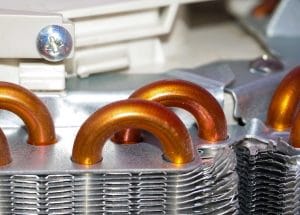 For most industrial thermal management solutions, the testament to a thermal management system’s effectiveness is often how much or how little it impacts other vital systems. For example, an inefficient and/or costly thermal management solution can place burdens on the productivity of other technology and equipment, as well on the employees tasked with ensuring that operations run smoothly. Conversely, a thermal management system that optimizes costs and efficiency, such as heat exchangers, can have equally beneficial impacts on a variety of other things, many of which contribute significantly to a company’s overall success. (more…)
For most industrial thermal management solutions, the testament to a thermal management system’s effectiveness is often how much or how little it impacts other vital systems. For example, an inefficient and/or costly thermal management solution can place burdens on the productivity of other technology and equipment, as well on the employees tasked with ensuring that operations run smoothly. Conversely, a thermal management system that optimizes costs and efficiency, such as heat exchangers, can have equally beneficial impacts on a variety of other things, many of which contribute significantly to a company’s overall success. (more…)
A Quick Look at How Ambient Heat Exchangers Work
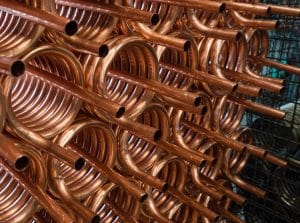 These days, heat exchangers come in a wide range of varieties according to any given application’s specific needs. However, some of the first (and still the most popular) versions are ambient units that keep electrical enclosures cooled to just above the ambient temperature outside of them. At first, ambient cooling technology proved a highly viable and more affordable alternative to solutions such as air conditioning and air compressors. However, even as the technology has advanced, relatively simple ambient heat exchangers still remain popular and highly effective cooling solutions. (more…)
These days, heat exchangers come in a wide range of varieties according to any given application’s specific needs. However, some of the first (and still the most popular) versions are ambient units that keep electrical enclosures cooled to just above the ambient temperature outside of them. At first, ambient cooling technology proved a highly viable and more affordable alternative to solutions such as air conditioning and air compressors. However, even as the technology has advanced, relatively simple ambient heat exchangers still remain popular and highly effective cooling solutions. (more…)
Different Methods Heat Exchangers Use to Transfer Heat
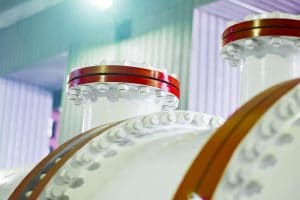 The specific methods that electrical cooling system use to prevent overheating are the most significant factors in what sets them apart. For example, traditionally, air conditioners utilize the process of chilling air and circulating it throughout an electrical enclosure. Slightly more advanced air compressors utilize similar principles, but don’t rely on Freon to chill the air first. By contrast, heat exchangers revolutionized the concept of electrical cooling by switching the focus from chilling air to removing heat. To do that, heat exchangers employ a variety of more efficient and eco-friendly heat transfer methods. (more…)
The specific methods that electrical cooling system use to prevent overheating are the most significant factors in what sets them apart. For example, traditionally, air conditioners utilize the process of chilling air and circulating it throughout an electrical enclosure. Slightly more advanced air compressors utilize similar principles, but don’t rely on Freon to chill the air first. By contrast, heat exchangers revolutionized the concept of electrical cooling by switching the focus from chilling air to removing heat. To do that, heat exchangers employ a variety of more efficient and eco-friendly heat transfer methods. (more…)
A Few Questions About Plate Heat Exchangers
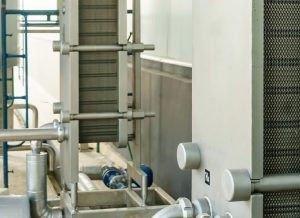 Since heat exchangers became popular as high-performance thermal management solutions, they’ve become even more versatile as manufacturers have developed numerous variations of the technology. For example, while heat pipe-based units were one of the first types of heat exchangers to be widely implemented, cold plates have become as equally common and popular for a wide variety of thermal management applications. Today, we examine why by answering a few questions about cold plates and their abilities to rapidly transfer high levels of heat across a variety of surfaces. (more…)
Since heat exchangers became popular as high-performance thermal management solutions, they’ve become even more versatile as manufacturers have developed numerous variations of the technology. For example, while heat pipe-based units were one of the first types of heat exchangers to be widely implemented, cold plates have become as equally common and popular for a wide variety of thermal management applications. Today, we examine why by answering a few questions about cold plates and their abilities to rapidly transfer high levels of heat across a variety of surfaces. (more…)
How to Make Thermal Management Greener
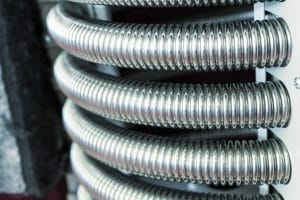 There are many ways in which companies can make significant strides in their quest to go green. For instance, energy-draining sources such as light fixtures and pollution-spewing vehicles are common targets for greener and more efficient initiatives, such as energy-saving light bulbs and electrical vehicles. Electrical thermal management isn’t as well-known, but it’s also an area in which companies can significantly improve their efforts at being more efficient and eco-friendly. Thanks to heat exchangers, keeping electrical enclosures and other technology and equipment consistently cool has become a much greener and more cost-efficient process than ever before. (more…)
There are many ways in which companies can make significant strides in their quest to go green. For instance, energy-draining sources such as light fixtures and pollution-spewing vehicles are common targets for greener and more efficient initiatives, such as energy-saving light bulbs and electrical vehicles. Electrical thermal management isn’t as well-known, but it’s also an area in which companies can significantly improve their efforts at being more efficient and eco-friendly. Thanks to heat exchangers, keeping electrical enclosures and other technology and equipment consistently cool has become a much greener and more cost-efficient process than ever before. (more…)
2 Areas Where Heat Exchangers Boost Manufacturing
 As technology has advanced over the last several decades, each innovation has built and improved upon previous concepts. For example, in the area of electrical thermal management, air conditioning (and later, air compression) used to be the standard solution. Yet, as electrical equipment and technology advanced, innovators improved the concepts of thermal management based on what those previous solutions taught them. For example, heat exchangers improved the process by eliminating many of the characteristics that made older thermal management technologies cumbersome, including the manner in which they control electrical waste heat. In doing so, they helped companies that rely on them become much more efficient in several different ways. (more…)
As technology has advanced over the last several decades, each innovation has built and improved upon previous concepts. For example, in the area of electrical thermal management, air conditioning (and later, air compression) used to be the standard solution. Yet, as electrical equipment and technology advanced, innovators improved the concepts of thermal management based on what those previous solutions taught them. For example, heat exchangers improved the process by eliminating many of the characteristics that made older thermal management technologies cumbersome, including the manner in which they control electrical waste heat. In doing so, they helped companies that rely on them become much more efficient in several different ways. (more…)
Do Medical Devices Use Heat Exchangers?
 Technology has always impacted the medical industry differently than others. For example, given the complexity of the industry and the interconnectedness of different organizations, healthcare has typically been slower than other fields to fully adopt certain technologies. At the same time, some of the most advanced technological innovations break ground in the medical field, where technology can dramatically impact the quality of patients’ healthcare. As the industry adopts increasingly more forms of advanced technology, the role of modern heat exchangers in the medical field becomes increasingly more prominent. That’s largely because of their ability to consistently and reliably control large amounts of electrical waste heat. However, it’s also because heat exchangers are designed in such a away as to optimize the safety of employees and patients who remain near them. (more…)
Technology has always impacted the medical industry differently than others. For example, given the complexity of the industry and the interconnectedness of different organizations, healthcare has typically been slower than other fields to fully adopt certain technologies. At the same time, some of the most advanced technological innovations break ground in the medical field, where technology can dramatically impact the quality of patients’ healthcare. As the industry adopts increasingly more forms of advanced technology, the role of modern heat exchangers in the medical field becomes increasingly more prominent. That’s largely because of their ability to consistently and reliably control large amounts of electrical waste heat. However, it’s also because heat exchangers are designed in such a away as to optimize the safety of employees and patients who remain near them. (more…)
How Heat Pipes Transfer Heat Efficiently
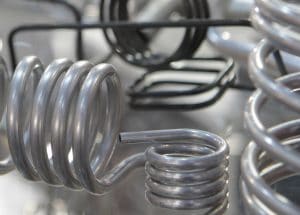 Over the last several decades since heat exchangers first became popular, they’ve undergone several different iterations, each one offering even more efficient and reliable thermal management. One of the most common and versatile iterations is the advent of heat pipes, which are high-performance heat spreaders that can fit into unique spaces and offer optimal heat transfer for advanced applications. Heat pipes are crafted from metal and lined inside with an absorbent capillary wicking material. Their innovative design allows them to absorb impressively high levels of electrical waste heat consistently and uniformly, all while minimizing the amount of space you need to designate to a system’s cooling apparatus. (more…)
Over the last several decades since heat exchangers first became popular, they’ve undergone several different iterations, each one offering even more efficient and reliable thermal management. One of the most common and versatile iterations is the advent of heat pipes, which are high-performance heat spreaders that can fit into unique spaces and offer optimal heat transfer for advanced applications. Heat pipes are crafted from metal and lined inside with an absorbent capillary wicking material. Their innovative design allows them to absorb impressively high levels of electrical waste heat consistently and uniformly, all while minimizing the amount of space you need to designate to a system’s cooling apparatus. (more…)
Advantages that Come with Streamlining Thermal Management
 When compared to air conditioners, the advantages of heat exchangers seem obvious. The most notable one is streamlining electrical thermal management by eliminating their reliance on air conditioning equipment. That means the high costs of implementing, running, maintaining, and repairing air conditioners no longer had to be accepted as par for the course. However, given the many important roles that thermal management has to a wide variety of applications, streamlining it provides an even wider variety of advantages. (more…)
When compared to air conditioners, the advantages of heat exchangers seem obvious. The most notable one is streamlining electrical thermal management by eliminating their reliance on air conditioning equipment. That means the high costs of implementing, running, maintaining, and repairing air conditioners no longer had to be accepted as par for the course. However, given the many important roles that thermal management has to a wide variety of applications, streamlining it provides an even wider variety of advantages. (more…)
Industries that Heat Exchangers Make More Efficient
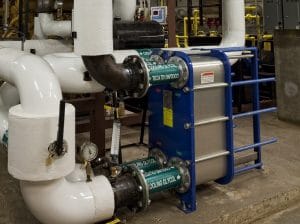 These days, nearly every industry relies on technology, the range of which is virtually limitless. Because all technology relies on efficient thermal management solutions, most industries have benefited from the widespread adoption of advanced heat exchangers. Everything from control panels for large electrical systems to faster, more powerful, and more efficient handheld devices now benefit from the efficient heat transfer capabilities of heat exchangers. Therefore, industries that rely on such technologies have been able to streamline their operations on several different fronts, the sum of which equals significantly improved efficiency and productivity. (more…)
These days, nearly every industry relies on technology, the range of which is virtually limitless. Because all technology relies on efficient thermal management solutions, most industries have benefited from the widespread adoption of advanced heat exchangers. Everything from control panels for large electrical systems to faster, more powerful, and more efficient handheld devices now benefit from the efficient heat transfer capabilities of heat exchangers. Therefore, industries that rely on such technologies have been able to streamline their operations on several different fronts, the sum of which equals significantly improved efficiency and productivity. (more…)







